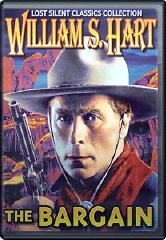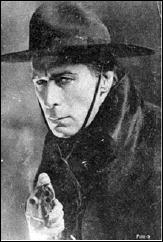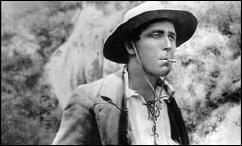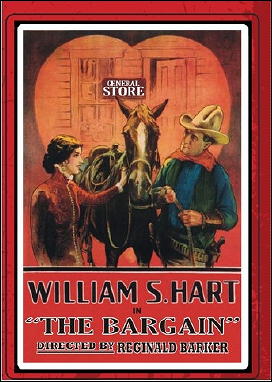Sun 6 May 2012
A Movie Review by Walter Albert: THE BARGAIN (1914).
Posted by Steve under Reviews , Silent films , Western movies[4] Comments

THE BARGAIN. New York Motion Picture Corp., 1914. William S. Hart, J. Frank Burke, Barney Sherry, James Dawley, Clara Williams, Charles Swickard, Roy Laidlaw, Herschel Mayall. Scenario by Thomas H. Ince and William H. Clifford; cinematography by Joseph H. August and/or Robert Newhard. Director: Reginald Barker. Shown at Cinevent 39, Columbus OH, May 2003.
Hart’s first feature-length film, The Bargain, as the program notes aptly pointed out, established the basic elements that would be a hallmark of the Hart Western (notably the concept of the good-bad man who is regenerated through his love for a good woman).

The film was shot in and near the Grand Canyon (with some sources claiming the cinematography was by Joseph August) and while the print was not always the sharpest, varying in quality from reel to reel, the Arizona landscape was captured in its startling beauty and awesome grandeur.
I was immediately struck by the opening sequence in which each of the cast members is first shown in evening attire, then as they bend over, hiding their face from the camera, they straighten up in makeup and costume for their on-screen-roles. (Dan Stumpf commented that he had seen this device used in at least one other Hart film.)
Hart plays outlaw Two-Gun Jim Stokes who, after he is wounded by a posse, is rescued by a farmer (J. Barney Sherry) who takes him to his shack, which he shares with his daughter Nell (Clara Williams).

Stokes and Nell fall in love, are married, and Stokes leaves to settle some unfinished business (he plans to return the money from his most recent holdup), promising to return.
He’s captured by Sheriff Bud Walsh (J. Frank Burke) but when Walsh, falling prey to temptation, gambles away the money he’s rescued from Stokes, Stokes strikes a bargain that will save Walsh’s reputation and allow Stokes to escape to a new life.
In a sense, The Bargain was Ince’s response to DeMille’s The Squaw Man. It made Hart a star and confirmed the Western as a major film genre.

May 8th, 2012 at 3:25 pm
This is an enjoyable review!
Cool credits with the actors coming out as on a stage, also occur in WHO PAYS: TOIL AND TYRANNY, another gem of the 1910’s. It’s on DVD, part of the TREASURES 3 set.
Haven’t seen THE BARGAIN. But William S. Hart made some gems like HELL’S HINGES and TUMBLEWEEDS. Really powerful stuff.
May 8th, 2012 at 4:41 pm
William S. Hart ought to be better known today as one of the giants of the early Western movie industry, but somehow I don’t believe he is.
After appearing in a 1908 production of BEN HUR and starting in 1914, Hart made 73 movies in the next 11 years, most of them appearing to be Westerns. (I’m looking at his credits on IMDB.)
But since his last film was TUMBLEWEEDS in 1925, it means all of his work took place in the silent era of movie-making. At best he’s only a name to someone not a movie fan, and then only to those of a certain age or more.
May 8th, 2012 at 6:01 pm
I’ve always liked William S. Hart. He was not your usual pretty boy hero wearing clean clothes, instead he was homely and his clothes were worn and tattered. I was even annoyed when I read that Marg Helgenberger of the CSI TV series had moved into his Hollywood house. I thought, who the hell is she to move into the home of William S. Hart. She’s nobody compared to Hart.
My wife’s father who lived to be 92, used to tell me about his experiences with silent films in the Trenton, NJ area. He and his rough friends liked Hart and used to call him “William Ass Hart”.
May 8th, 2012 at 7:03 pm
The silent period of film was like a different world of what we think of as filmmaking. It was centered in New York until Edison’s demands for a piece of the action and his reported enforcers drove many filmmakers out of the city.
There is even the fondly told story about some filmmakers who were looking for a place to set up a film studio far enough away to escape Edison’s thugs. They were traveling on train to Phoenix, but it was raining that day so they continued on West and found Hollywood.
Another of my favorite stories (stories don’t have to be true) is most silent film actors did not make the crossover to talkies not because of their voice but because it was no longer fun. In silents there were no lines to learn, you can be drunk or high and still work, it was wild parties – so the story goes – all the time.
Both of those stories tell a great deal about the era. The power of the rich such as Edison. The attitude about life as WWI and the Spanish Flu wiped out so many young people.
It is a shame that even today our image of the silent film is distorted by film speed difference.